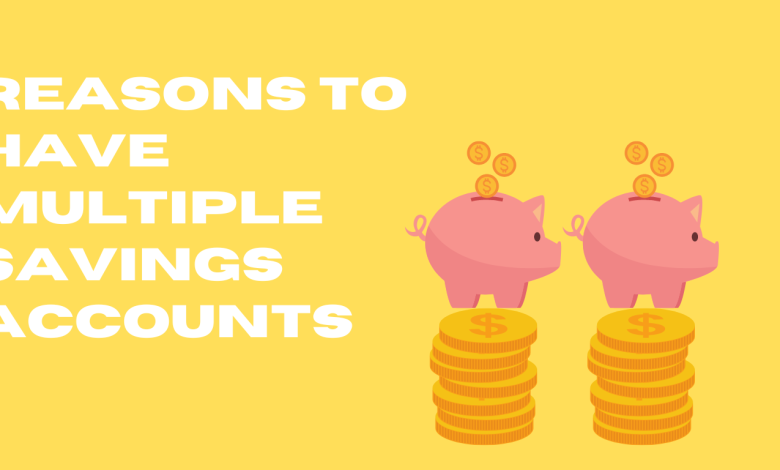Reasons to Have Multiple Savings Accounts

One of the most effective strategies for people to save money is to open a savings account. A solid savings account will keep your money safe and offer you interest, which will help you build your balance over time. Interest rates vary by bank. Women and senior citizens may qualify for a higher interest rate.
Many people only have one savings account, despite the fact that they are excellent. Multiple savings accounts, on the other hand, can provide you with additional advantages. Having numerous accounts allows you to simplify your savings, be more financially disciplined, better manage your spending, and take advantage of multiple bank incentives.
So, if you haven’t yet opened another savings account in addition to your primary one, here are some reasons why you should.
Track your progress
If you only have one savings account, it’s simple to maintain track of your bank accounts, but keeping track of your numerous savings goals can be challenging. A single savings account with lump-sum savings can be deceiving because it’s difficult to know how much money you’ve set aside for a certain purpose. Most of the time, your objectives will overlap, and you will have less money than you believe for a specific aim. You can run out of money when it’s time to buy. It’s possible that you’ll have to divert money from target A to goal B. Having many savings accounts, on the other hand, ensures that you never lose sight of your finances. You can open a separate savings account for various goals such as buying a new car, going on a vacation, having some cash set aside for emergencies, etc.
You can simply track your progress toward a goal by glancing at each account’s balance, giving you clear visibility into how much you’ve saved so far per goal, if you set up three distinct accounts – one for each goal.
Manage your savings better
You can better manage your finances by having multiple savings accounts. According to your financial and personal goals, you can save in several accounts. You may, for example, utilize one account for a specific purpose, such as travel, retirement, or a child’s education, and the other for your daily spending. You may also have a primary account for normal expenses, a salary account for when you are paid, and a joint account with your spouse that both of you can use. Furthermore, if you have a critical financial requirement that necessitates immediate liquid cash, you might keep a separate savings account as an emergency fund. The amount of accounts you can have is unrestricted.
Setting aside more money
Having various savings accounts might assist you avoid accumulating a huge balance in one account, which can entice you to spend your money. You’ll probably want to set up automatic transfers to keep each savings account growing. Automatic payments from your primary account to your secondary savings accounts can be set up. This will ensure that you save money at the start of each month. The remaining balance can then be used for your monthly expenses. This makes it easier to prevent overpaying. Furthermore, if you only have one account and have a considerable amount saved, you may be tempted to spend it. Having modest balances in various savings accounts, on the other hand, works to reduce this urge.
Save on tax
Every savings account pays interest, as previously mentioned. This savings account interest will be credited to your savings account. Interest earned in India is subject to taxation. The bank deducts tax at the source under the 1961 Income Tax Act. When the interest generated on a bank account surpasses Rs. 10,000, this is deducted. So, if you save for your future needs in one savings account, you’ll likely end up with a greater bank balance. As a result, a higher interest rate. When you pay taxes on it, the tax you pay cancels out your earnings. However, if you have many savings accounts, you can receive interest on all of them while avoiding taxes.
Savings are insured
In the event that your bank fails or closes, the Deposit Insurance and Credit Guarantee Corporation (DICGC) pays the equivalent of your savings deposit or up to Rs. 5 lakh in insurance money. The DICGC provides insurance to commercial banks, international banks, local banks, and regional rural banks. In addition, both the principal and interest amounts are insured up to a maximum of Rs. 5 lakh. So, if you spread your investments over several institutions, you’ll be covered up to Rs. 5 lakh in insurance. If you have more money in a single bank account, however, you run the risk of losing them if the bank closes.
Reduce the chance of misspending
If you have a single savings account with a large sum of money in it, the desire to spend it is strong. Because you can access all of your money with a single bank transfer,. Having everything in one place makes it easy to spend.
When you open multiple savings accounts, the balances in each account will be reduced, making it more difficult to feel as if you have additional money to spend. It also makes it more difficult to spend your money, particularly if you have accounts at multiple banks.




